THE COMPLAINTS
PROCESS
The Complaint Process
Professional Standards of Care and Conduct
Veterinary professionals are required to meet the standard of care, skill, knowledge and conduct expected of a competent and ethical professional. They are also required to provide clients with a simple, complete and understandable explanation of the treatment recommended and provide an estimate of the anticipated costs before proceeding and an itemized invoice afterwards.
If you have a concern about the care your animal received or your veterinary professional’s conduct, the first step is to discuss the matter directly with your veterinary professional. Many concerns relate to misunderstandings that can be resolved by clear and forthright communication. As well, when dealing with a complex animal health issue, obtaining a second opinion from another veterinarian may give you a different perspective and additional helpful information.
Role of the SVMA
All veterinarians and veterinary technologists practising in the province must be registered and are governed by the Saskatchewan Veterinary Medical Association (SVMA) which is the statutory body created by The Veterinarians Act, 1987 to oversee, in the public interest, the practice of veterinary medicine in Saskatchewan. As the professional regulatory body, the SVMA is responsible for establishing and enforcing standards of professional competence and conduct for all members and for responding to complaints about veterinary professionals.
The SVMA protects you and your animals by:
- establishing and maintaining standards of practice
- inspecting veterinary practices to ensure clients are provided with a suitable environment and essential equipment for the care of animal patients
- investigating specific complaints about veterinary professionals related to the practice of veterinary medicine
- assessing applications for registration
- maintaining standards of competence through continuing education
- addressing concerns and complaints about the conduct or practise of licensed veterinary professionals
Under The Veterinarians Act, 1987, the Professional Conduct Committee (PCC) handles all complaints and conducts all investigations as quickly as possible. The PCC can direct an investigation on a public complaint, the report of a practice inspector, or on any information brought to its attention, bearing in mind the matters it is authorized to investigate:
- a contravention of The Veterinarians Act, 1987 or the bylaws or practice standards;
- a failure to comply with a standard, limit or condition imposed under The Veterinarians Act, 1987,
- a conviction for an indictable offence;
- a conviction for an offence relating to the care or treatment of animals;
- professional incompetence or misconduct;
- a physical or mental ailment, an emotional disturbance or an addiction to alcohol or drugs that may impair a registrant’s ability to practise veterinary medicine.
A complaint may ultimately be resolved by consent with the veterinary professional, sent to a discipline hearing or dismissed.
Reasons for Dismissal of a Complaint
The professional conduct committee may dismiss complaints for the following reasons:
- the complaint is trivial, frivolous, vexatious or made in bad faith;
- the complaint concerns a matter over which the association does not have jurisdiction;
- the complaint gives rise to an abuse of process;
- the complaint is filed for an improper purpose or motive;
- there is no reasonable prospect the complaint will be substantiated;
- the substance of the complaint has been appropriately dealt with in another proceeding.
A licensed veterinary professional must cooperate with an investigation, including providing information or records requested by the PCC. The professional conduct committee may impose interim suspensions and restrictions, as can the discipline committee pending the outcome of a hearing.
Making a Complaint
In order for the SVMA to review and investigate complaints from the public, the complaint must be submitted using the SVMA Complaint Form and must be signed by the complainant(s). The statement of complaint should clearly and precisely set out the following information:
- the name of the veterinarian being complained about
- the name of the veterinary facility
- a description of the problem
- an outline of the concerns or issues for the committee to consider
- the dates on which the events occurred
- the name and contact information of anyone who may be able to provide further information
- copies of invoices or other documentation that may aid the committee in its review of the issues
- the complainant’s full name and mailing address

